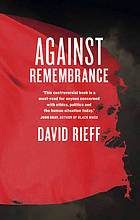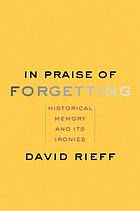What’s the point of remembering historical traumas? Has remembering the Holocaust prevented genocides? What of 9/11? Why do we remember these things? To what purposes do we put our memories? Are they always for good?
But most times they are not memories at all, not really. They are political stories we have chosen to latch on to for specific reasons. No-one in Ireland “remembers” the Irish Easter Rising. No-one in Australia “remembers” Gallipoli. Why do we sacralize certain political stories we call memories? And why do we even call them memories? To what use do we put these “memories”?
Remembrance as a species of morality has become one of the more unassailable pieties of the age. Today, most societies all but venerate the imperative to remember. We have been taught to believe that the remembering of the past and its corollary, the memorialising of collective historical memory, has become one of humanity’s highest moral obligations.
But what if this is wrong, if not always, then at least part of the time? What if collective historical memory, as it is actually employed by communities and nations, has led far too often to war rather than peace, to rancour and resentment rather than reconciliation, and the determination to exact revenge for injuries both real and imagined, rather than to commit to the hard work of forgiveness?
That’s quoted from an article by war correspondent David Rieff in a Guardian article, The cult of memory: when history does more harm than good.
Provocative, yes. Thought-provoking, too.
The questions I opened with are based on an interview with David Rieff on the Late Night Live program on Australia’s Radio National. Interviewer Philip Adams: In praise of forgetting. That’s the link to the most excellent interview. Promise to listen to it before you go any further. (I have not yet fully read the Guardian article I quoted from above but this post is inspired by the interview.)
The two related books by David Rieff:
His recently published In praise of forgetting : historical memory and its ironies. And not forgetting his earlier Against Remembrance.


Neil Godfrey
Latest posts by Neil Godfrey (see all)
- What Others have Written About Galatians (and Christian Origins) – Rudolf Steck - 2024-07-24 09:24:46 GMT+0000
- What Others have Written About Galatians – Alfred Loisy - 2024-07-17 22:13:19 GMT+0000
- What Others have Written About Galatians – Pierson and Naber - 2024-07-09 05:08:40 GMT+0000
If you enjoyed this post, please consider donating to Vridar. Thanks!

The idea sounds almost palatable when one is talking about Australians forgetting Gallipoli, but would these authors advocate that Australian aborigines forget the injustices of the past as well? Or that the descendants of slaves in the US put that all behind them?
Australian aborigines or black Americans may remember or forget whatever they choose to. I don’t give chickenshit what they do or do not. It’s their lives and their decisions. The problem is with wool-brained bleeding heart whites who are unable to distinguish between a serious effort to understand history and the chutzpah racket of extorting “atonement” privileges from the society at large.
One time in the US I popped into a supermarket that was open on Independence day. I made a remark to the cashier sympathizing with her for having to work on a public holiday. Sher replied that it meant nothing to her, since her ancestors had been slaves. I thought (but, with uncharacteristic tact, did not say) “And you, too, are a slave – enslaved to the past rather than relishing the present.”
We can all select past events to suit our available information, interests, values, politics, &c. You can’t remember or share everyone else’s favorites, let alone everything.
Compare e.g. Holocaust Remembrance with Gulag Remembrance, or US with Brazilian, Muslim or African slavery.
Is it better to forget everything than to record as much as possible as truthfully as possible? Then to examine past events for “lessons” to be drawn – rationally – from the material available?
Collective racial guilt for the behavior of some ancestors is not rational in my judgement – any more than Original Sin inherited from Adam & Eve.
Not being a native speaker myself, I notice that the English language is rather ‘economic’ on the subject of remembering. The verb to remember, actually refers to 2 very different phenomena: (1) recalling in your mind some of your own previous experiences, and (2) honouring (venerating) some past event.
Listening to Rieff’s interview, I understand him as saying that remembering (1) is OK, and not really the subject of his book. It is remembering (2) that is bothering him. *
And I understand that his misgivings around remembering (2) become more serious the longer ago the remembered events (allegedly) took place. And the worst case is when events are remembered (2) that did not take place at all, or when their meaning is distorted to achieve political goals.
* Also note that Rieff says that ‘collective memory doesn’t exists’. He is clearly referring to remembering (1) only here. Collective remembering (2) happens all the time (ANZAC day, 4th July, 14 Juillet etc.).
Show me ONE instance of officious remembrance NOT being a part of someone´s selfish political agenda. I suspect it would be as good as impossible to find any. Therefore, it makes no sense at all to discuss remembrance of historical traumas on a purely sociopsychological, let alone philosophical level. This phenomenon shall be examined together with all other tricks employed by unscrupulous political marketing, that´s all there is to it.
You write like a true bigot. Can you name ANY cause or good thing in society that is “NOT part of someone’s selfish political agenda”? Therefore….?? Ever thought of opening up your mind to genuinely learning how other people think and feel?
Perhaps I am a true bigot, I do not really care. If true bigots get the same thoughts as such a cute guy as myself, they must be pretty smart, right? 🙂 As if.
But seriously, internet is brimming with reports about what all sorts of people think and feel. It’s not the point. The point is you have just admitted “remembrance” belongs to every true bleeding heart’s cattle of holy cows AKA “good causes”. My life experinece tells me: send this cattle to the abattoir ASAP before it makes a mess of everything valuable in this civilization. If one wants to make sense of this or that difficult chapter of the past, perfect, be my guest. But if the actual objective is to ride a wave of artificially injected guilt feelings, on and on, generation after gneration, then all I say is, not with me, go get an honest job instead.
I suggest you try a game. Before ever engaging gear to express your own opinion, first attempt to sum up what you sincerely believe to be the viewpoint of the one you are about to contradict or oppose and ask him/her if you have it down pat. Once you are assured you really do know what they are thinking or “admitting” THEN start to speak. That way you will have a better chance of knowing what you are talking about and your point of view will have some merit! 🙂
Before playing any game with the rule you suggest, I would like to make sure we comply with a much more basic one that reads: Stick to the original subject. Therefore, let’s go up the thread and see how it all started. You may then find out that I not just understand what that blogpost is about but also welcome its topic as important, even overdue. However, the evident next step is to ask what optics to use to look at it. Here, my proposition is that metaphysics won’t help. We simply don’t have reliable tools to assess the effect of remembrance cults on the society’s psyche. On the other hand, applied political science abounds with useful tools. A well-cultivated remembrance cult promises its priests and ministrants innumerable perks such as grants, subsidies, scholarships, university chairs, lucrative posts in public administration and NGOs, media attention, etc., you name it. And this is just in the West. In other parts of the world, a remembrance cult, if you work it right, can make you a popular movement leader and a head of provincial government (India) or a president (Serbia, many states in Africa, etc.) Manifestations of this phenomenon are well-documented by multiple mutually independent reasonably reliable sources (unlike early Christianity, to refer to something readers of these pages are familiar with). There is more than enough data for extensive research. My wild guess regarding its outcome: even if remembrance as a specific post-religious social obsession is found to be a source of numerous evils, it is unlikely to be abandoned due to many livelihoods dependent on it.
By contrast, ad hominems are not part of sticking to the discussion topic. A widespread variety, the notorious dogooder ad hominems, include accusations of bigotry and emotionally loaded complaints about missing empathy with this or that damaged minority. But, sorry to say, public debate that tiptoes around someone’s feelings is useless. Emotion management belongs elsewhere, subject to a strict subsidiarity regime: most people are able to cope themselves and those who do not may find it useful to look up help. At least shrinks claim it is useful.
You sound put out that I did not tiptoe around your feelings or work some “emotion management” upon you. Play the game I told you to or go away.